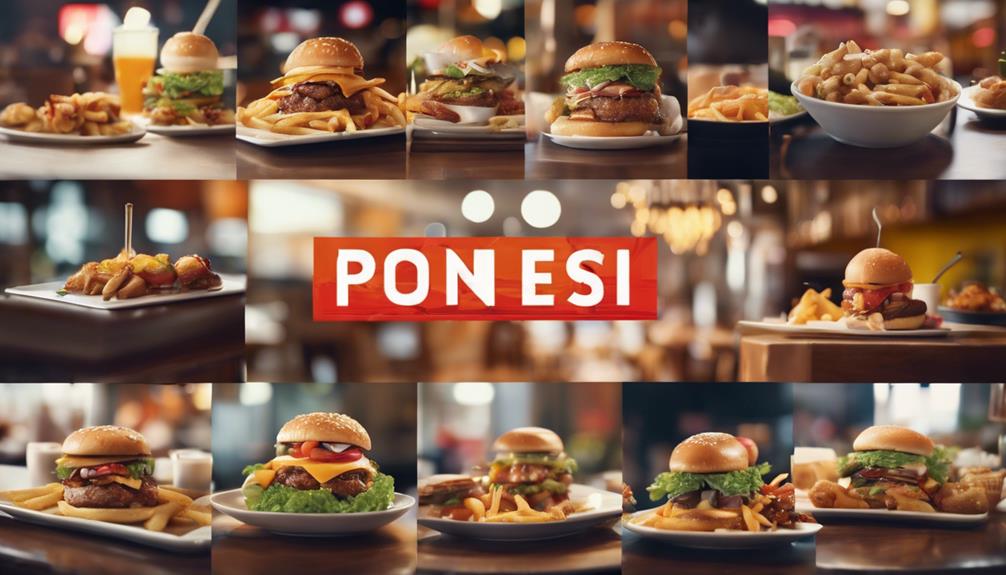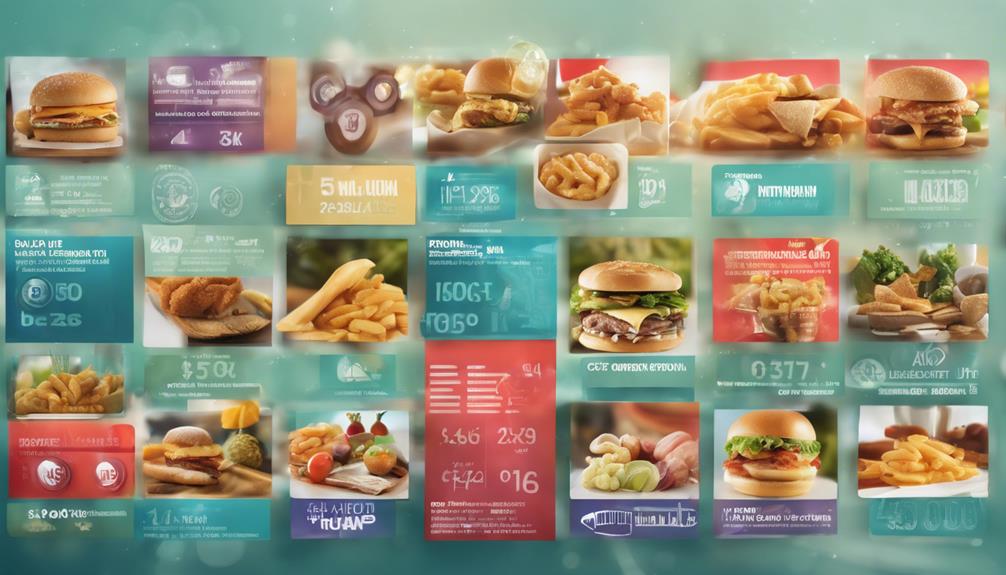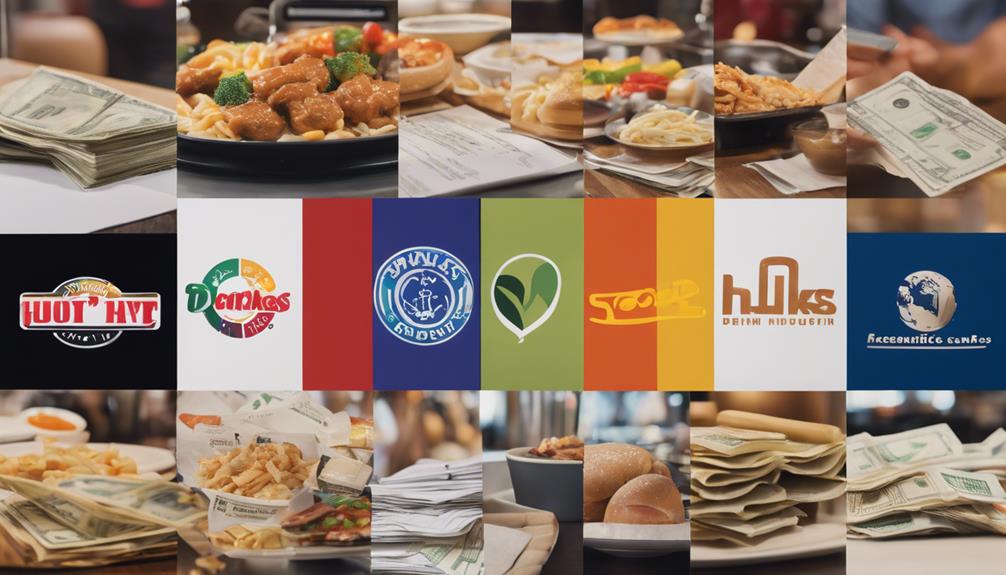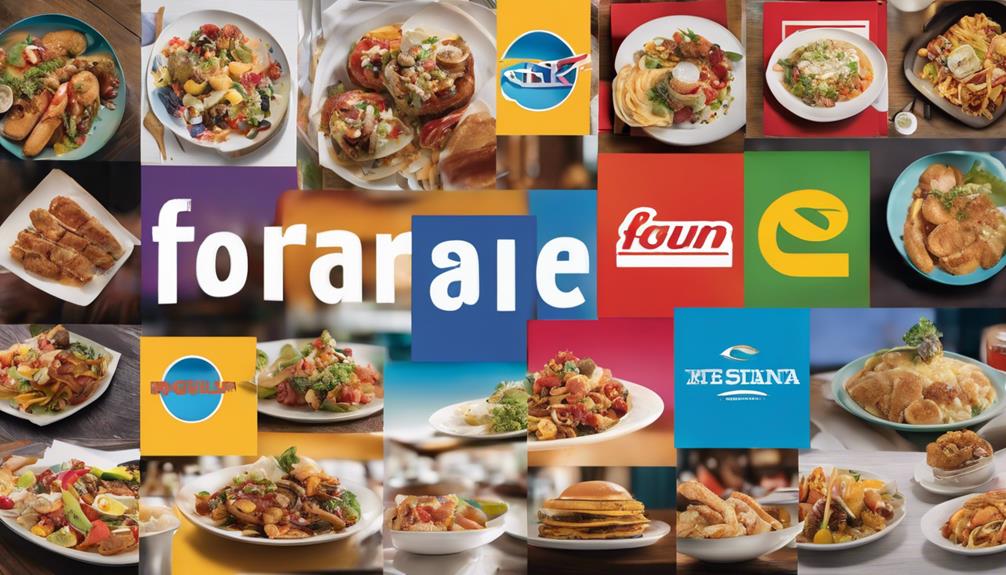The food franchise sector is booming, making it an excellent time for aspiring entrepreneurs. Today, 25% of the Franchise 500 consists of food brands, indicating vast opportunities. Leading names like McDonald's and Dunkin' continue to thrive, thanks to strong brand recognition, diverse menus, and robust support systems for franchisees. Newer concepts, such as acai bowl shops, also attract interest, reflecting changing consumer tastes. With varied initial investments and financial support options, potential franchisees can find the right fit for their goals. There's much more insight on maneuvering this dynamic market ahead, ensuring informed decisions for aspiring franchise owners.
Key Elements

When evaluating food franchises, three key elements stand out: company overview, business overview, and information for franchisees.
These components provide essential insights into the franchise's operations, support systems, and overall potential for success.
Understanding these factors helps prospective investors make informed decisions.
Company Overview
A successful food franchise is characterized by strong brand recognition, a solid support system for franchisees, and a diverse menu that appeals to a wide customer base.
These franchises often provide thorough training programs, ensuring that new franchisees have the tools and knowledge to succeed. Additionally, they typically maintain robust marketing strategies that enhance brand visibility and attract customers.
Many of the top food franchises also focus on innovation, adapting their offerings to meet changing consumer preferences. Moreover, a commitment to quality and consistency across locations helps build customer loyalty.
Business Overview
Key elements of a successful food franchise include strong brand recognition, extensive support for franchisees, and a diverse menu that appeals to a broad customer base.
A well-established brand not only attracts customers but also builds trust and loyalty.
Franchisees benefit from thorough training programs, marketing assistance, and ongoing operational support, which enhance their chances of success.
Additionally, a varied menu caters to different tastes and dietary preferences, ensuring a wider audience.
Financial stability plays a significant role as well, enabling franchises to navigate market fluctuations effectively.
Information for Franchisees
Franchisees must understand several key elements that influence their success in the food franchise industry.
First, they should familiarize themselves with annual rankings, as about 25% of the Franchise 500 consists of food franchises, evaluated based on costs, growth, and support.
Next, potential franchisees must consider initial investment amounts, which can vary markedly among popular brands like Dunkin' and McDonald's.
It's also essential to assess franchisee support and brand strength, as these factors impact long-term profitability.
In addition, consulting legal and financial advisors guarantees informed decisions.
Company Overview

Companies in the food franchise sector each have unique histories and milestones that shape their identities.
Understanding their core purposes, goals, and the qualifications of their executive teams reveals how they navigate the competitive landscape.
This overview sets the stage for exploring what makes each franchise a standout choice for potential investors.
Founding Year and Milestones
Founded in the early 1950s, McDonald's has become a global icon in the fast-food industry, celebrating numerous milestones that reflect its growth and adaptability.
The brand opened its first franchise in 1955, marking the beginning of its expansion. In 1961, Ray Kroc purchased the company, setting the stage for rapid growth, which included the introduction of the Big Mac in 1968.
By the 1980s, McDonald's had established itself in international markets, with the first restaurant opening in Canada. In 2003, the company launched its 'I'm Lovin' It' campaign, strengthening brand recognition worldwide.
Today, McDonald's operates thousands of locations across the globe, continuously innovating its menu and services to meet evolving consumer preferences.
Core Purpose and Goals
McDonald's aims to provide customers with high-quality food and exceptional service while fostering a commitment to community engagement and sustainability. The company's core purpose revolves around creating a welcoming environment where everyone can enjoy delicious meals.
McDonald's sets clear goals, such as expanding its menu with healthier options and reducing its environmental footprint. They actively invest in training their employees to guarantee excellent customer experiences, enhancing operational efficiency.
Additionally, McDonald's collaborates with local communities to support various initiatives, including education and hunger relief programs. By aligning their business practices with social responsibility, McDonald's not only strengthens its brand but also builds lasting relationships with customers, making it one of the leading food franchises today.
Executive Team Qualifications
The executive team at McDonald's brings together a wealth of experience and diverse backgrounds, ensuring strategic leadership and innovative vision for the brand's continued success.
With seasoned professionals from various industries, they possess expertise in operations, marketing, and finance.
Their collaborative approach fosters a culture of continuous improvement and adaptability, essential for maneuvering the fast-paced food franchise landscape.
Each member is committed to enhancing franchisee support and brand strength, driving McDonald's to remain a leader in the market.
This team's qualifications not only reflect their individual accomplishments but also their collective ability to align with the company's core purpose and goals, ultimately contributing to the franchise's sustained growth and profitability.
Competitive Landscape Overview
In today's competitive food franchise landscape, brands must continually innovate and adapt to meet evolving consumer preferences and market demands.
Major players like McDonald's, Dunkin', and Pizza Hut dominate the scene, offering diverse menus and robust franchisee support.
Investment requirements can range considerably, with options like Cinnabon starting at around $60K, while McDonald's can exceed $2.5M.
Each franchise's success hinges on strong brand recognition and financial stability.
As the market grows, emerging concepts in niche categories, such as acai bowl shops, also gain traction.
Franchisees need to carefully evaluate their choices based on personal interests, operational support, and market demand to find the right fit in this dynamic environment.
Brand Identity

Brand identity plays an essential role in a franchise's success, as it influences consumer loyalty and community engagement.
Strong brands differentiate themselves through unique strategies that resonate with their target audience.
Understanding these elements can help potential franchisees make informed decisions about their investments.
Consumer Loyalty Ratings
Consumer loyalty ratings play an essential role in shaping a franchise's brand identity, reflecting how well it resonates with customers over time.
High loyalty ratings indicate that customers consistently choose a particular brand, which can lead to repeat business and positive word-of-mouth.
Franchises like Dunkin' and McDonald's have established strong connections with their consumers, thanks to their commitment to quality and consistency.
These ratings often stem from factors like product quality, customer service, and brand reputation.
Additionally, franchises that actively engage with their customers, solicit feedback, and adapt to their preferences tend to enjoy stronger loyalty.
Ultimately, robust consumer loyalty ratings can greatly enhance a franchise's market position and long-term success.
Commitment to Community Engagement
Many successful food franchises not only focus on customer loyalty but also prioritize community engagement as a key component of their brand identity.
These brands actively seek to connect with local communities through various initiatives, including charity events, sponsorships, and partnerships with local organizations. By participating in community-driven activities, franchises enhance their visibility and foster goodwill among potential customers.
This commitment to giving back not only strengthens their brand image but also creates a loyal customer base that values social responsibility.
Additionally, many food franchises encourage their employees to volunteer, further embedding community engagement into their corporate culture.
Such efforts demonstrate that these franchises aren't just about profits; they genuinely care about the communities they serve.
Brand Differentiation Strategies
Successful food franchises often employ unique differentiation strategies to create a distinct identity that resonates with their target audience.
They craft compelling brand narratives that emphasize quality, heritage, or innovative offerings, setting them apart in a crowded market. For instance, franchises like Dunkin' focus on convenience and speed, while Cinnabon highlights indulgence and nostalgia.
Visual branding, including logos and color schemes, plays an essential role in consumer recognition. Additionally, consistent messaging across platforms reinforces brand identity, ensuring customers know what to expect.
These strategies not only foster loyalty but also attract new customers seeking a particular experience or product. In today's competitive landscape, effective brand differentiation is key to sustained growth and success in the food franchise industry.
Information for Franchisees

Franchisees need to thoroughly understand the support and resources available to them from their chosen food franchise to guarantee a successful partnership. Most franchisors provide extensive training programs covering operations, marketing, and customer service, ensuring franchisees are well-prepared.
Ongoing assistance often includes access to a dedicated support team, which can help troubleshoot issues and implement best practices. Additionally, franchisees may benefit from collective purchasing agreements that lower costs on supplies and ingredients.
It's crucial for prospective franchisees to ask about these resources during the selection process, as strong support can greatly impact long-term success. Understanding the available tools and guidance will enable franchisees to navigate challenges and capitalize on opportunities effectively.
Financial Requirements & Ongoing Fees

When considering food franchises, potential investors must understand the financial requirements and ongoing fees involved.
Initial investments can range from $60,000 to $2.5 million, depending on the franchise.
Additionally, franchisees often face royalty fees, marketing contributions, and maintenance costs tied to their gross sales.
Investment Range: $60k – $2.5m
Investing in food franchises can range dramatically from as low as $60,000 to as high as $2.5 million, reflecting the diverse financial requirements and ongoing fees associated with different brands. This broad spectrum allows potential franchisees to find options that suit their budget and business goals.
For instance, brands like Cinnabon may require a lower initial investment, while giants like McDonald's command higher capital due to their established reputation and support systems. Ongoing fees, such as royalties and marketing contributions, also vary, impacting overall profitability.
Prospective investors should carefully evaluate each franchise's financial structure, ensuring they understand both upfront costs and long-term commitments before making a decision.
Initial Franchise Investment Cost
Understanding the initial franchise investment cost is essential for potential investors, as it encompasses not only the upfront capital required but also the ongoing fees that can greatly impact long-term profitability.
Each food franchise presents varying financial demands, from initial setup costs to monthly royalties. For instance, brands like Arby's and Dunkin' require significant investments ranging from $438K to over $2.5M.
Ongoing fees, including marketing contributions and operational costs, can further influence cash flow. Investors should carefully assess these financial commitments to guarantee they align with their business goals.
Consulting with a financial advisor can provide deeper insights, helping to navigate the complexities of franchise costs and guaranteeing a well-informed investment decision.
Percentage of Gross Sales
Franchisees typically encounter ongoing fees that are calculated as a percentage of gross sales, impacting their profitability and financial planning. These fees can vary considerably, often ranging from 4% to 10% of gross sales, depending on the franchise brand.
For instance, well-established franchises may charge higher percentages due to their strong brand recognition and support systems. It's essential for prospective franchisees to understand these financial commitments upfront, as they directly influence monthly cash flow and overall profitability.
Additionally, franchisees should factor in these percentages when creating financial projections and budgets. Knowing the ongoing fees helps franchisees make informed decisions, ensuring they're prepared for the financial realities of running a successful food franchise.
Marketing Contribution Requirements
Many food franchises require franchisees to contribute a percentage of their gross sales to marketing efforts, ensuring brand visibility and customer engagement. This marketing contribution typically ranges from 1% to 5%, depending on the franchise, and is vital for funding national advertising campaigns and promotional initiatives.
These contributions help maintain a cohesive brand image across various locations and attract more customers. Franchisees benefit from shared marketing resources, which can enhance their individual success.
Additionally, some franchises may implement one-time fees for local marketing support or specific campaigns, allowing franchisees to target their market effectively.
Understanding these marketing contribution requirements is essential for potential franchisees to gauge the financial commitment involved in operating a food franchise successfully.
Royalty Fees and Maintenance Costs
Royalty fees and maintenance costs play an essential role in the financial landscape of food franchises, influencing both profitability and operational sustainability. These ongoing fees typically range from 4% to 8% of gross sales, impacting franchisees' bottom lines considerably.
Additionally, maintenance costs can include expenses for equipment upkeep, renovations, and supplies, which vary by franchise brand. For instance, established names like McDonald's and Dunkin' might command higher royalties due to their brand strength and support systems.
Understanding these financial requirements is important for prospective franchisees, as they must balance initial investments with long-term obligations. Careful financial planning guarantees they can maintain profitability while meeting franchise standards and customer expectations effectively.
Financing Options

When considering food franchises, potential investors should explore various financing options to fund their venture.
Many franchises offer in-house funding options, while alternative sources and government-backed loans can provide additional support.
Understanding these financing avenues can greatly impact the success of a franchise investment.
In-House Funding Options Available
In-house funding options can help aspiring franchisees manage their initial investment costs more effectively. Many top food franchises offer financing programs directly to their franchisees, making it easier to secure the necessary capital.
These options often include low-interest loans, payment plans, or leasing agreements tailored to fit the franchisee's financial situation. By utilizing in-house funding, franchisees can streamline their startup process and reduce reliance on external lenders.
Additionally, some franchises provide financial incentives, such as discounts on franchise fees or support with equipment purchases. This integrated approach not only eases the financial burden but also fosters a strong relationship between the franchisor and franchisee, promoting long-term success in a competitive market.
Alternative Funding Sources Available
Exploring alternative funding sources can provide aspiring franchisees with additional financial flexibility beyond traditional bank loans.
Many franchisees turn to crowdfunding platforms, where they can attract small investments from a large pool of people.
Another option includes peer-to-peer lending, which connects borrowers directly with individual investors willing to fund a portion of the franchise investment.
Additionally, some franchise systems offer in-house financing, allowing franchisees to pay for their initial investment in installments.
Investors might also consider using retirement accounts, like a 401(k), through a process known as ROBS (Rollovers as Business Startups).
Each of these options can greatly ease the financial burden while securing the necessary capital to launch a successful food franchise.
Government-Backed Loan Providers
Government-backed loan providers offer aspiring franchisees reliable financing options to help turn their business dreams into reality.
These loans often come with lower interest rates and more favorable terms compared to traditional financing. Programs like the Small Business Administration (SBA) loans specifically cater to franchise owners, allowing them to secure funds for startup costs, equipment, and operational expenses.
Franchisees can benefit from the assurance that these loans are backed by the government, which reduces lender risk. Additionally, many lenders understand the unique needs of food franchises, providing tailored support throughout the application process.
Training & Support Offered

When evaluating food franchises, the training and support they offer can greatly impact a franchisee's success.
Thorough onboarding sessions equip new owners with essential knowledge, while continuous skill enhancement programs keep them updated on industry best practices.
Additionally, operational training and marketing tools guarantee franchisees have the resources they need to thrive in a competitive market.
Comprehensive Onboarding Sessions
Thorough onboarding sessions provide franchisees with essential training and ongoing support to guarantee a successful launch and operation of their food franchise.
These sessions typically cover critical aspects like menu preparation, customer service, inventory management, and marketing strategies. Franchisees gain hands-on experience and learn about operational standards that align with the brand's values.
Additionally, dedicated support teams are available to address questions and provide guidance as franchisees navigate the initial challenges of running their business. This robust training framework guarantees that franchisees are well-equipped to handle day-to-day operations, fostering confidence and competence.
Ultimately, extensive onboarding sessions are crucial for establishing a strong foundation, leading to long-term success in the competitive food franchise market.
Continuous Skill Enhancement Programs
Franchisees benefit from ongoing skill enhancement programs designed to keep them updated on industry trends and operational best practices. These programs provide valuable training sessions that focus on new technologies, customer service techniques, and efficient management strategies.
Regular workshops and webinars enable franchisees to share insights and learn from one another, fostering a strong community. Many franchises also offer access to a dedicated support team, ensuring franchisees have the resources they need to succeed.
Operational Training and Marketing Tools
Operational training and effective marketing tools play an essential role in equipping franchisees with the skills and resources they need to succeed in a competitive food industry.
Top food franchises offer extensive training programs, covering everything from operational procedures to customer service excellence. Franchisees receive hands-on training at various levels, ensuring they're well-prepared to manage their locations.
Additionally, robust marketing tools, such as social media templates, promotional materials, and brand guidelines, help franchisees effectively reach their target audience. Ongoing support is often available, including field representatives who assist with local marketing strategies.
LEGAL AND REGULATORY

When considering food franchises, understanding legal compliance guidelines is essential for prospective owners.
These regulations can greatly affect operations, from health standards to employment laws.
Franchisees need to stay informed to navigate the complexities of the legal landscape effectively.
Franchise Legal Compliance Guidelines
Franchise legal compliance is essential for any food franchisee, as it guarantees adherence to local and federal regulations.
They need to review key sections of the Franchise Disclosure Document (FDD) and understand their legal obligations clearly.
This understanding not only protects their investment but also helps maintain the franchise's reputation and operational integrity.
Key Sections to Review
Understanding franchise legal compliance guidelines is essential for potential investors to navigate the complexities of franchising successfully.
These guidelines outline the responsibilities of franchisors and franchisees, ensuring ethical practices and transparency.
Investors should review franchise disclosure documents, understand state regulations, and be aware of their rights.
Staying informed about legal requirements helps mitigate risks and fosters a more secure investment environment.
Legal Obligations
Potential investors must familiarize themselves with the legal obligations that govern franchising to guarantee compliance and protect their interests.
This includes understanding the Franchise Disclosure Document (FDD), adhering to local zoning laws, and ensuring compliance with health regulations.
Investors should also be aware of their rights and responsibilities under the franchise agreement, as well as any ongoing legal requirements specific to their franchise type.
MARKET ANALYSIS

The market is seeing a significant shift in consumer preferences, particularly among health-conscious Millennials and Gen Z.
These demographics prioritize nutritious options, influencing food franchises to adapt their menus accordingly.
As a result, franchises that emphasize healthy offerings are gaining traction in today's competitive landscape.
Consumer Preferences Shifting Toward Health
Consumer preferences are increasingly leaning towards health-focused dining options, prompting food franchises to adapt their menus.
As people become more health-conscious, they're seeking dishes that align with their wellness goals.
This shift has led to the emergence of innovative health-focused menu trends across various franchise brands.
Health-Focused Dining Preferences Rising
Health-conscious diners are increasingly seeking out food franchises that prioritize nutritious ingredients and balanced menus.
This shift in consumer preferences reflects a growing awareness of health and wellness, compelling many franchises to adapt.
Diners now favor options that support their dietary goals, prompting franchises to innovate and offer healthier alternatives.
As a result, the demand for health-focused dining continues to rise markedly.
Health-Focused Menu Trends Emerging
Emerging trends in food franchises reflect a significant shift toward healthier menu options, driven by increasing consumer demand for nutritious and balanced meals.
Franchises now incorporate plant-based dishes, low-calorie alternatives, and organic ingredients to attract health-conscious patrons.
This focus not only caters to changing preferences but also enhances brand loyalty, positioning these franchises at the forefront of the evolving food industry landscape.
Health-conscious Millennials and Gen Z
Health-conscious Millennials and Gen Z are driving significant changes in the food franchise landscape.
Their preference for nutritious options reflects broader consumer health trends, emphasizing fresh, organic, and sustainable ingredients.
As these generations prioritize wellness, franchises must adapt to meet their evolving tastes and values.
Health-Conscious Millennial Preferences
Millennials and Gen Z are increasingly leaning towards food options that prioritize nutrition and sustainability, reflecting a growing demand for healthier menu items in the franchise landscape.
They favor franchises that offer plant-based, organic, and locally sourced options.
Additionally, transparency in ingredient sourcing and eco-friendly practices resonates with these consumers, driving franchises to adapt their offerings to meet these health-conscious preferences effectively.
Consumer Health Trends Insights
Today's consumers are increasingly prioritizing nutrition and sustainability in their food choices, prompting franchises to adapt their menus accordingly.
Health-conscious Millennials and Gen Z seek options rich in plant-based ingredients, low in processed sugars, and environmentally friendly.
This shift drives franchises to innovate, offering healthier alternatives and transparent sourcing, ensuring they meet the evolving demands of these influential consumer groups.
EXIT STRATEGY

When considering an investment in food franchises, planning an exit strategy is essential.
Franchise buyback programs and clear transfer process guidelines can greatly impact a franchisee's ability to sell or change their business.
Understanding these options helps franchisees make informed decisions for their future.
Franchise Buyback Programs
Franchise buyback programs offer a strategic exit option for franchisees looking to shift out of their business while maximizing their investment. These programs allow franchisees to sell their locations back to the franchisor, often at a fair market value.
This arrangement not only provides an efficient means of exiting but also guarantees that the franchisee's hard work and capital investment are acknowledged. Many top food franchises implement such programs to maintain brand integrity and support their franchisee network.
By participating in a buyback program, franchisees can alleviate the stress of finding a buyer independently, guaranteeing a smoother changeover and enabling them to focus on future ventures or retirement plans.
Ultimately, these programs enhance the overall franchise system.
Franchise Transfer Process Guidelines
Steering the franchise transfer process requires careful planning and adherence to specific guidelines to guarantee a smooth handover for both the outgoing franchisee and the new owner.
First, the outgoing franchisee should notify the franchisor about their intention to sell, as many agreements stipulate approval rights.
Next, they need to make certain all financial obligations are settled, including outstanding fees and debts.
The franchisor often requires the new owner to undergo training and meet specific qualifications.
Additionally, transparency is crucial; providing potential buyers with accurate financial records can facilitate a quicker sale.
Finally, legal documents must be meticulously reviewed and signed to complete the transfer.
ADDITIONAL RESOURCES

When exploring food franchises, potential investors can benefit from various additional resources.
Franchisee success stories provide real-world insights, while support contact details guarantee that help is just a call away.
Networking opportunities further enhance knowledge-sharing and collaboration among franchisees.
Franchisee Success Stories
Highlighting remarkable journeys, many food franchise owners have transformed their initial investments into thriving businesses, showcasing the potential for success in this competitive market.
Take the story of a Dunkin' franchisee who started with a single location and now operates three, thanks to a strong community focus and excellent customer service.
Similarly, a McDonald's franchisee turned their passion for hospitality into a profitable empire, expanding from one to five outlets within a decade.
These franchisees credit their achievements to effective training programs and supportive networks that empower them to overcome challenges.
Their experiences illustrate how dedication, hard work, and leveraging franchise resources can lead to significant financial rewards and personal fulfillment in the food franchise industry.
Franchisee Support Contact Details
Many food franchises offer robust support systems for their franchisees, providing essential resources and contact details to guarantee their success. These support systems typically include dedicated franchisee support teams, training programs, and ongoing operational assistance.
Franchisees can access valuable contact details through franchise portals or support hotlines, ensuring they receive timely help for any questions or challenges.
Additionally, many franchises conduct regular webinars and workshops, enhancing their franchisees' knowledge and skills. They also maintain thorough FAQs and resource libraries online, allowing franchisees to find information quickly.
Franchise Networking Opportunities
Franchise networking opportunities provide valuable connections that can enhance a franchisee's success and growth potential in the competitive food industry.
By engaging with fellow franchisees, individuals gain insights into best practices, operational challenges, and innovative marketing strategies.
Many franchisors host annual conferences and regional events, fostering collaboration and sharing of experiences.
Additionally, online forums and social media groups allow franchisees to connect and exchange ideas from anywhere.
These networks can also lead to partnerships for local promotions or co-branding efforts.
Ultimately, leveraging these connections not only strengthens a franchisee's business acumen but also builds a supportive community, essential for maneuvering the complexities of the food franchise landscape.
What Makes Chick-fil-A Stand Out Among Other Food Franchises?
Chick-fil-A’s success lies in its commitment to quality and service, with the “chickfila legacy chicken success” shining through in every bite. Their focus on customer satisfaction and community involvement sets them apart from other food franchises, making them a beloved choice for chicken lovers everywhere.
Conclusion
To sum up, exploring food franchises offers aspiring entrepreneurs a wealth of opportunities.
By considering key factors like investment costs, franchisee support, and brand strength, they can make informed choices that align with their goals.
With thorough research and legal guidance, potential franchisees can confidently navigate the competitive landscape.
Ultimately, the right franchise can lead to a rewarding journey, turning culinary passions into successful business ventures that thrive in today's dynamic market.









